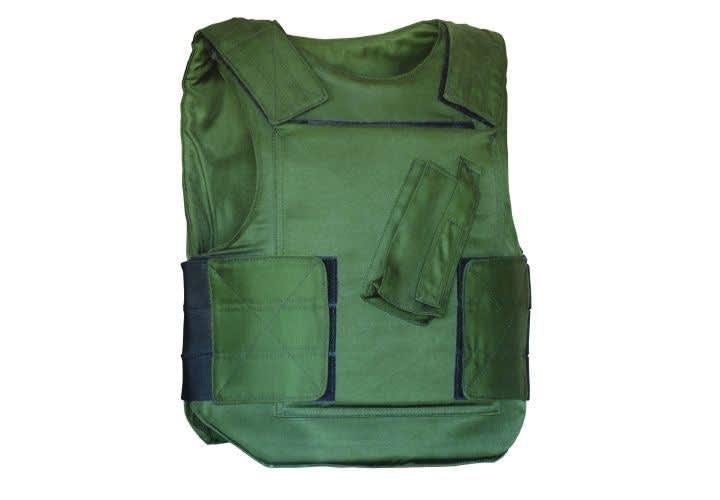Guidelines from the National Institute of Justice call for manufacturer warranties on ballistic vests to last five years. This means over the course of a career in law enforcement you could easily wind up going through four or five yourself. When your body armor warranty expires and you receive a new vest, what do you do with the old one? From recycling to repurposing, there are multiple options depending on your agency's policies and resources.
Second Hand
It used to be fairly common to pass on older ballistic vests to law enforcement agencies in the United States and abroad that didn't have enough money to purchase their own new body armor. But this is no longer as common because of liability concerns.
"I would not give, sell, or offer any used body armor, for I would fear a claim of the vests being out of date or of our providing less than safe equipment," says Chief William L. Harvey of the Ephrata (Pa.) Police Department. "I am just lawsuit weary after too many years as a chief." Harvey has also turned down requests by parents of soldiers to send used ballistic panels overseas to the military for the same reasons. "Again, I worry about the implied liability," he says.
The Orange County (Fla.) Sheriff's Office has even been wary of requests from local judges that want to use ballistic panels to line desks in their chambers for added protection from criminals.
Other factors come into play as well. When body armor is sold to a police department, it is contracted for and delivered directly to that agency and each vest is fitted specifically for the intended recipients. After their initial use, not only might the vests have suffered wear and tear, but if a vest does not fit the secondary wearer well it will not provide the same protection. Then there is the concern of body armor falling into the wrong hands somewhere along the way.
"We want to make sure armor isn't ending up in any felon's hands, or someone who doesn't understand what the vest is or is not capable of," explains Jeff Fackler, North American marketing and product manager for DuPont.
Vest Disposal
For these very reasons, some body armor manufacturers will collect an agency's vests that are past warranty and destroy them on a limited basis.
"From time to time, we've collected used vests from police agencies at little or no charge to the department," says Matt Davis, president and CEO of Armor Express. "The vests are then disassembled and cut into scrap at our factory. Most vests today are hybrid constructions utilizing multiple ballistic materials. Some materials have 'scrap value' and can be sold to recyclers, but other materials have no value and have to be discarded."
Disposing of ballistic vests is a costly enterprise, whether simply destroying them so they can't be used for nefarious purposes or dismantling them for scrap. Therefore manufacturers and distributors can't destroy vests on a regular basis. There just isn't a sustainable system in place.
"This is something we're attending to. It's a need in the industry," says Fackler.
Alternatively, agencies can work with independent contractors to destroy vests and or to recycle the materials. According to Sgt. Carlos Nieves, the New York Police Department works with a contractor to destroy any vests it doesn't send back to the manufacturer.
"The first part for a department looking to use a recycling program is they do need to work with someone who's reputable and can provide documentation," says Fackler.
The same holds true for companies that specialize in destroying vests. If you're unsure of where to begin, contact other agencies and even body armor manufacturers for recommendations.
Finding New Life
But then, not everyone wants to get rid of a vest that's past warranty. Many officers have found ways to put them to good use when given the opportunity.
Although the Torrance (Calif.) Police Department disposes of most of its vests past warranty, not all of them meet such a fate. "Sometimes they are kept to use in training scenarios or as emergency temporary issue," says Officer Chad Farley. "We have also donated them to smaller departments in other states and even other countries that could not afford new vests."
It appears training is a popular application for used vests. Ken Lewis of the Orange County Sheriff's Office says his agency uses older vests as props for training scenarios. "In the past I have taken the used vest panels to construct clearing barrels for the ranges," says Chief Harvey.
More inventive uses for ballistic vests past their warranty include:
Putting them between the driver's seat and cage in a patrol car
Putting them in the driver's side car panel
Lining the rear of the trunk
Keeping several in the trunk with a roll of duct tape to tape them on the sides of the car to aid in rescuing an officer
Lining walls of vans used for tactical operations
Lining office desks
So what is the right thing to do with a used ballistic vest? That's still up for debate. It comes down to a question of creativity, liability, and cost. Police departments and the body armor industry are currently working to develop more and better options for the future.













